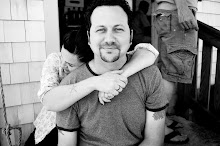I met Jill McDonough at a forum in New York City on Hurricane Katrina in late September of 2005. I had driven through the night from Oxford, Mississippi to get there and spoke with an impassioned delirium about how the tragedy of Hurricane Katrina merely served to expose the poverty and inequality in New Orleans that I had seen long before the storm while working on behalf of people facing the death penalty here. Jill came up to me after the event and introduced herself, said, "Bless your heart," told me that she was writing a series of poems about executions in American history, and offered to bake me cookies and bring me bourbon as her form of Katrina relief. A couple of days later, she sent me a number of her poems as well as a translation of Francios Villon's Epitaph, a poem that I had obsessed over in college, that had pushed me toward becoming a lawyer for people facing the death penalty.
Villon's poem, written from the perspective of a man who had been hanged, had made clear to me that there was little moral distinction between the condemned and those who judge him and that we are all very much in need of absolution, or as Jill puts it in her translation, "some slack."
Epitaph, Francois Villon, Translated by Jill McDonough
Brother humans, who’ll be here when we’re gone,
Don’t let your hearts turn so hard against us.
If you have pity for us, the poor ones,
God’s more likely to grant you his mercies.
You see here, strung up, five or six of us:
You see our flesh, which we have fed so well.
It was slowly devoured, after it swelled.
And we, the bones, are now just dust and ash.
Don’t laugh: we’re already miserable.
Just pray that God cuts all of us some slack.
Don’t be insulted if we call you some
kin to us, brothers. We’re sure that justice
was done in our deaths, but not everyone
has the sense to avoid being reckless.
So you stand up for us, since we’re helpless:
talk to the Son of the Virgin and He’ll
listen: He’ll pour out grace in liberal
doses, save us from Hell’s thunderous crash.
We’re dead now. Don’t make fun or give us hell;
Just pray that God cuts all of us some slack.
We never rest. We’re never left alone:
first we’re here, then there, as the wind changes.
Swinging corpses is its idea of fun.
The rain has soaked us through and laundered us.
The sun has dried us out and blackened us.
Crows and ravens have plucked out our eyeballs
and pulled our beards and eyebrows out as well.
We’re pocked as thimbles from the birds’ attacks:
Don’t do what we’ve done: see how far we fell?
Just pray that God cuts all of us some slack.
Prince Jesus, you are master over all:
Help us; make sure that we don’t go to Hell.
We have no dealings there, and that’s a fact.
Men, it’s no good mocking: it’s not His will.
Just pray that God cuts all of us some slack.
***
Just in case her offers of cookies, bourbon, and five hundred year old French poetry by a poet/thief weren't going to be enough to make me love her forever, Jill also sent me her own sonnets about the two executions of Willie Francis here in Louisiana:
May 3, 1946: Willie Francis
St. Martinsville, Louisiana
They brought Louisiana’s only chair
in a pick-up from Angola into Saint
Martinsville Parish, to the Court House, where
a fifteen-year-old colored boy had lain
on straw for months. Jailhouse on the second floor:
Death kindly took the elevator. Wires
were tossed from dynamo to window. Four
men setting up the chair passed flasks, dead tired
and innocent of amps. They called the priest,
and pulled the switch, and thought he’d die. He shook
and lurched and gasped-- You’re not supposed to breathe!
They shut it down, freed him from straps and hood.
Then Willie Francis stood up without help
and --miracle, miracle--walked back to his cell.
May 9, 1947: Willie Francis
Saint Martinsville, Louisiana
The Times reporters asked him to describe
the taste of death. Cold peanut butter. Fair
stars, little speckles: pink and green, like shines
in a rooster’s tail. He said God fool’d with the chair.
His father smashed his gravestone into slivers
of granite. Hundreds wrote divine intervention,
how gold electrodes would corrode and silver
wires short if they tried to kill that boy again.
Like Daniel in the lion’s den; those men
in Nebuchadnezzar’s furnace; unusual; cruel;
double jeopardy. None of these could save him.
At noon the chair was ready, voltage full.
He said everything is all right and died
without pink stars, green, anything divine.
***
These poems make me believe that art and culture can bring about social justice by helping people to better understand their thoughts and feelings about the world they live in. It's hard to imagine someone reading any of these poems and then voting on a jury to send someone to death, supporting a politician who uses the death penalty as a political tool, or, at the very least, not having a touch of human empathy for the "reckless," "helpless," and "miserable."

Billy,
ReplyDeleteGreat post. Your line - "These poems make me believe that art and culture can bring about social justice by helping people to better understand their thoughts and feelings about the world they live in." -
rings true.
Thank you
As a blogger, I try to have my poetry inform my blogs. You are on the right track. Maybe I am, or will be, too. It's about time, it's all about time...
ReplyDeleteThanks -Jim